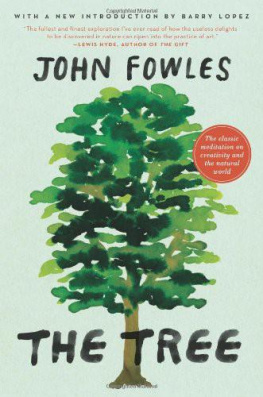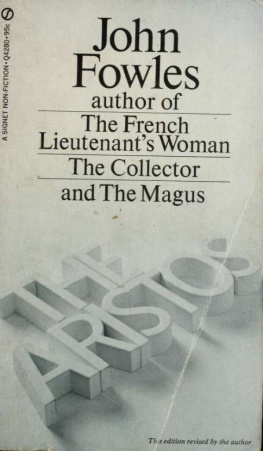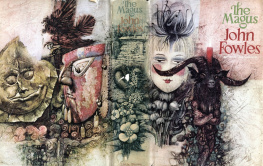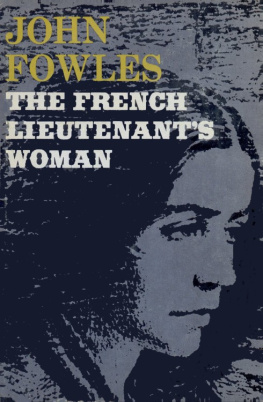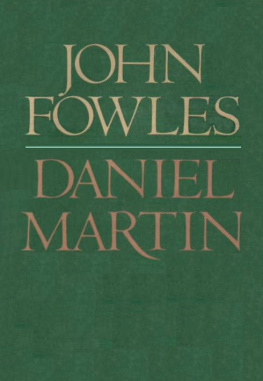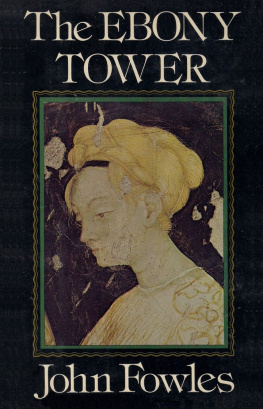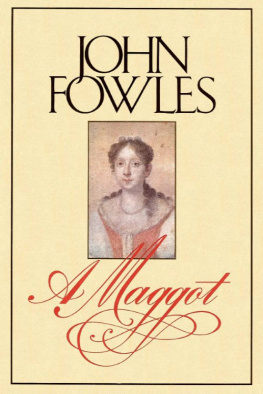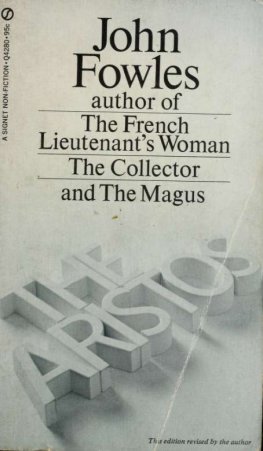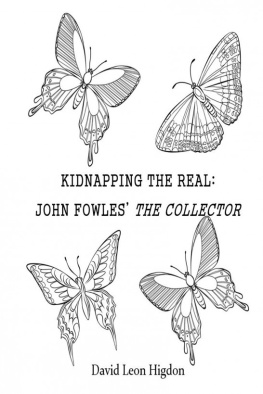John Fowles - The Tree
Here you can read online John Fowles - The Tree full text of the book (entire story) in english for free. Download pdf and epub, get meaning, cover and reviews about this ebook. year: 2010, publisher: Ecco, genre: Science. Description of the work, (preface) as well as reviews are available. Best literature library LitArk.com created for fans of good reading and offers a wide selection of genres:
Romance novel
Science fiction
Adventure
Detective
Science
History
Home and family
Prose
Art
Politics
Computer
Non-fiction
Religion
Business
Children
Humor
Choose a favorite category and find really read worthwhile books. Enjoy immersion in the world of imagination, feel the emotions of the characters or learn something new for yourself, make an fascinating discovery.
- Book:The Tree
- Author:
- Publisher:Ecco
- Genre:
- Year:2010
- Rating:5 / 5
- Favourites:Add to favourites
- Your mark:
- 100
- 1
- 2
- 3
- 4
- 5
The Tree: summary, description and annotation
We offer to read an annotation, description, summary or preface (depends on what the author of the book "The Tree" wrote himself). If you haven't found the necessary information about the book — write in the comments, we will try to find it.
The Tree — read online for free the complete book (whole text) full work
Below is the text of the book, divided by pages. System saving the place of the last page read, allows you to conveniently read the book "The Tree" online for free, without having to search again every time where you left off. Put a bookmark, and you can go to the page where you finished reading at any time.
Font size:
Interval:
Bookmark:
The Tree
John Fowles
1979
T he first trees I knew well werethe apples and pears in the garden of my childhood home. This maysound rural and bucolic, but it was not, for the house was asemi-detached in a 1920's suburb at the mouth of the Thames, someforty miles from London. The back garden was tiny, less than a tenthof an acre, but my father had crammed one end and a side-fence withgrid-iron espaliers and cordons. Even the minute lawn had fiveorchard apple trees, kept manageable only by constant debranching andpruning. It was an anomaly among our neighbours more conventionalpatches, even a touch absurd, as if it were trying to be a fragmentof the kitchen-garden of some great country house. No one in factthought of it as a folly, because of the fruit those trees yielded.
The names of apples and pears are rather like thenames of winesno sure guide in themselves to quality. Two labelsmay read the same; but the two trees that wear them may yield fruitas different as a middling and a great vineyard from the same slope.Even the same tree can vary from year to year. As with the vine, theessential things are soil, situation, annual climate; but after thosechance factors, human care. My fathers trees, already happy in thealluvial clay of the area, must have been among the most closelypruned, cosseted and prayed for in the whole of England, andregularly won him prizes at local shows. They were certainly thelinest-flavoured of their arietiesmany increasingly rare, thesesupermarket days, because of their commercial disadvantages, such astender flesh or the mysterious need to be 'eaten from the treethatI have ever tasted. Memories of them, of their names and flavours,Charles Ross and Lady Sudeley, Peasgood's Nonsuch and King of thePippins, haunt me still. Even the more popular kinds he grew, such asthe Comice, or the Mozart and Beethoven of English pomology, JamesGrieve and Cox's Orange, acquired on his cunningly stunted trees arichness and subtlety I have rarely met since. This may have beenpartly because he knew exactly when they should be eaten. A Comicepear may take many weeks to ripen in store, but it is at its peak foronly a day. Perfection in the Grieve is almost as transient.
These trees had a far greater influence on our livesthan I ever realized when I was young. I took them as my fatherpresented them to the world, as merely his hobby; as unexceptional,or inevitable, as his constant financial worries, his disappearingevery day to London, his duodenal ulceror on a happier side hisweek-end golf, his tennis, his fondness for watching county cricket.But they were already more than trees, their names and habits andcharacters on an emotional parity with those of family.
There was already one clear difference between myfather and myself, but the child I was did not recognize it, or sawit only as a matter of taste, perhaps of age, mere choice of hobbyagain. The difference was in any case encouraged and in my eyessanctified by various relatives. I had an uncle who was a keenentomologist and who took me on occasional expeditions into thecountrynetting, sugaring, caterpillar-hunting and all the rest ofitand taught me the delicate art of setting' what we caught.
Then there were two cousins, much older than I was.The first was a tea planter in Kenya, a keen fly fisherman and biggame shot, and indisputably to me, on his occasional home leaves andvisits to us, the luckiest man in the world. The other was thatindispensable member of any decent middle-class English family, adetermined eccentric, who no more fitted suburbia and its values thana hedgehog fits a settee. He managed to combine a bewildering set ofprivate interests: in vintage claret, in long-distance running (wherehe was of international standard), in topography, and in ants, onwhich he was an authority. I envied him enormously his freedom to goon walking tours, his endless photography of exotic places, his soundgeneral field knowledge of nature, and it puzzled me that my fatherregarded this fascinating human being as half-mad.
What these relatives very soon aroused in me was apassion for natural history and the countryside; that is, a longingto escape from those highly unnatural trees in our back garden, andall they stood for. In this, without realizing it, I was alreadytrampling over my fathers soul. More and more I secretly cravedeverything our own environment did not possess: space, wildness,hills, woods... I think especially woodland, real' trees. Withone or two exceptionsthe Essex marshlands, Arctic tundraI havealways loathed flat and treeless country. Time there seems todominate, it ticks remorselessly like a clock. But trees warp time,or rather create a variety of times: here dense and abrupt, therecalm and sinuousnever plodding, mechanical, inescapablymonotonous. I still feel this as soon as I enter one of the countlesssecret little woods in the Devon-Dorset border country where I nowlive; it is almost like leaving land to go into water, anothermedium, another dimension. When I was younger, this sensation wasacute. Slinking into trees was always slinking into heaven.
Whether this rift would ever have developed as it didbetween my father and myself if Hitler had not been born, I cannotimagine. As it was, the hazards of the Second World War made itinevitable. We had to leave our Essex suburb for a remote Devonshirevillage, where all my secret yearnings were to be indulged beyond mywildest dreams. I happily forgot his little collection of crimped andcramped fruit trees in my own new world, my America of endlessnatural ones in Devon. I will come to what mine meant, and mean, tome, but I must first try to convey what I now suspect his meant tohim; and why they did. As I grow older I see that the outwardlyprofound difference in our attitudes to natureespecially in theform of the treehad a strange identity of purpose, a kind of jointroot-system, an interlacing, a paradoxical pattern.
My father was one of the generation whose lives weredetermined once and for all by the 1914-18 War. In most outward wayshe was conventional and acutely careful not to offend the mores ofthe two worlds he lived in, suburbia and business London. Before thewar he had trained to be a solicitor; but the death of a brother atYpres, then of his own typically Late-Victorian father, twice marriedand leaving endless children to support, forced him into the tobaccotrade. The family firm was nothing very grand. It specialized inHavana cigars, hand-made briar pipes, its own line of pure Virginiacigarettes (another lost flavour) , and had two or three shops,including one in Piccadilly Arcade with a distinguished occasionalclientele. For various reasonscertainly not for lack of worryingon my fathers partit went into decline all through the 1930's,and the Second World War killed it for good. But every day when I wassmall my father, like most of his male neighbours, went off in suitand bowler to London: an hour by train there, an hour back. I veryearly decided that London was synonymous with physical exhaustion andnervous anxiety, and that the one thing I would never be was acommutera determination, I suspect, my father also held on mybehalf, though for rather different reasons.
I can see now that the Great War took a doubly crueltoll on himnot only in those abominable years in the trenches, butin its social effect. He was given a taste of the life of the officerand gentleman, especially in the post-war period when he was in theoccupation army in Germany. From then on he was condemned to theethos and aspirations of a class, or way of life, that hisincreasingly unsuccessful business did not permit; and which ouractual family background made rather absurd. My great-grandfather wasclerk to an attorney in Somerset, and I think his father was ablacksmith. I like having such very ordinary ancestors, but myfather, being only a generation away from the rise out of immemorialWest Country obscurity into well-to-do mercantile London, did not. Hewas not a snob, he simply hankered after a grander sort of life thanlife allowed. (He did not even have the snobs outlet of doingsomething about it, since he was intensely cautiousand had tobeover money, a trait he neither inherited from his own father norpassed on to me.) It was far less that he believed in what we wouldcall today upward social mobility than that he permanently missed thejolly expansiveness, the three-men-in-a-boatishness, of a large 1800Sand Edwardian household and the style and dash of an HonorableArtillery Company mess. None of this makes him in anyway unusual; buthe had other private anomalies beside his little sacred grove offruit trees.
Next pageFont size:
Interval:
Bookmark:
Similar books «The Tree»
Look at similar books to The Tree. We have selected literature similar in name and meaning in the hope of providing readers with more options to find new, interesting, not yet read works.
Discussion, reviews of the book The Tree and just readers' own opinions. Leave your comments, write what you think about the work, its meaning or the main characters. Specify what exactly you liked and what you didn't like, and why you think so.

